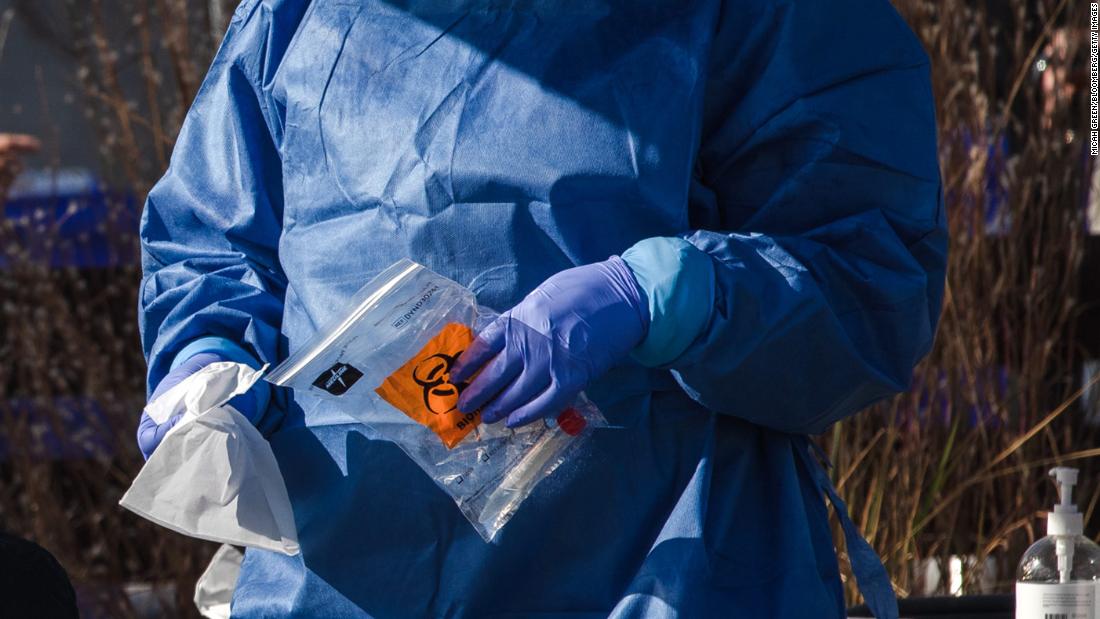“The best thing we could do to increase the chances that the vaccine will continue to work as we hope is to reduce cases as much as possible, without these reductions occurring as a result of immunity derived from the vaccine,” said Dr. Michael Mina, an epidemiologist and an immunologist at the Harvard School of Public Health TH Chan, said during an event on Tuesday.
The United States reported more than 59,500 new cases of Covid-19 on Tuesday – a far cry from the total of six-digit cases it reported just a month ago. But experts warn that the number of infections is still high and there may be another increase if Americans let their guard down.
That is why measures like masks and social detachment continue to play a key role, because if the virus continues to circulate at high levels, it will likely come into contact and try to infect people who have been vaccinated, said Mina.
“The more opportunities we give the virus to get in touch with someone who is immune, the more opportunities there are for the virus to find a way to get around that level of immunity and these antibodies,” added Mina.
More than 1,270 cases of the variant have been reported in 41 states and Washington, DC, according to data from the Centers for Disease Control and Prevention. Approximately one third of these cases are in Florida, CDC data show.
On Tuesday, Quest Diagnostics announced that it was also conducting sequencing tests to support CDC’s efforts to track mutations, adding that the company had already doubled the amount of genomic sequencing it started doing last month.
Fauci changes vaccination schedule for the American public
The United States also faces challenges ahead of vaccines.
Dr. Anthony Fauci told CNN on Tuesday that it may now be mid-May or early June before vaccines are available to the general population – changing the timeline of previous estimates that put a wide availability of vaccines around the end of April.
“This was based on (the Johnson & Johnson vaccine) having considerably more doses than we now know they are going to have,” said Fauci. “So this schedule is likely to be extended until mid-May and early June.”
Management expects millions of single-digit doses for the vaccine if it is authorized for emergency use. However, due to a lack of communication on the production schedule, government officials thought the number would increase to between 20 or 30 million doses by April. But now, they are expecting less than 20 million doses in April, a government official told CNN.
Separately, President Joe Biden on Tuesday promised that 600 million doses of the Covid-19 vaccine would be available to the country by the end of July, “enough to vaccinate all Americans”.
More vaccine challenges: inequality, climate and scarce supply
Among the other difficulties the United States is working to overcome are inequality in the distribution of vaccines, the cold climate and a shortage of supplies.
But the newly released data shows “the scale of the challenge that lies ahead,” said Dr. Torian Easterling, first deputy commissioner and director of actions for the city’s health department.
“There is a much smaller proportion of vaccines going to black and brown New Yorkers. We see these geographical disparities also manifesting,” said Easterling, adding that the South Bronx, parts of Central Queens and Central Brooklyn, lag behind in vaccinations.
Ohio Governor Mike DeWine said vaccine shipments delivered to state suppliers directly from Pfizer and Moderna could be delayed by a day or two because of the weather. In Georgia, health officials said they also expected delays in vaccine arrival, adding that many providers and health departments were forced to reschedule vaccine appointments.
In some parts of the country, supply problems are delaying firing.
The Beaumont healthcare system in Michigan canceled more than 1,880 second-dose consultations that were scheduled for Thursday after it learned of an “unexpected and significant reduction” in the distribution of Pfizer vaccines across the state, system officials said in a statement to the press.
“The health care system is working to automatically reschedule all canceled appointments for a week later, at the same time and on the same day of the week, as long as the state provides enough vaccine,” the statement said. “Beaumont is also seeking further clarification from the state on these much-needed second doses.”
Michigan Department of Health and Human Services spokeswoman Lynn Sutfin said the state was working with Beaumont Health last week to reconcile its second dose shortage, adding that it was “a pity that they chose to cancel the second dose consultations while we continued to work with them on this issue. “
CNN’s Amanda Sealy, Kaitlan Collins, Maggie Fox, Chris Boyette, Rebekah Riess, Amanda Watts, Sara Murray, Naomi Thomas and Michael Nedelman contributed to this report.
